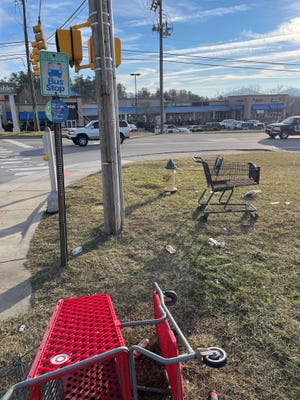Answer Man: Trash, carts at bus stops? Insurance policy pulled after spouse's death? – Citizen Times

Today’s batch of burning questions, my smart-aleck answers and the real deal:
Question: Curious if the city of Asheville has any plans to address the trash situation at bus stops. I am not sure if you have noticed, but many of them are being treated as a dumping ground for trash and shopping carts. It is a shame some individuals are abusing this city property with trash, while also stealing items such as shopping carts from good, locally owned employers such as Ingles. Asheville and its taxpayers are providing dependable, low-cost public transportation with very expensive labor and equipment, and this is what they get in return? The city then has to waste more money sending people to clean up the mess. Good employers like Ingles have to raise prices so they can cover losses from stolen shopping carts which are expensive as well. Who ends up paying? City taxpayers, anyone who shops at Ingles and individuals who depend on other city programs when money has to be wasted and redirected to cleaning up litter. Maybe the city should instruct bus drivers not to stop if the bus stop is in these conditions.
My answer: While not stopping for passengers might be an effective way to limit garbage and shopping cart theft, I’m not sure it would be the most effective way to actually transport people from one place to another.
Real answer: First of all, shopping cart theft is a huge problem for all retailers.
“According to the Food Marketing Institute in Washington D.C., annual costs due to cart theft is around $800 million,” bigbasketco.com reported last year in a blog post titled, “Protecting Against Shopping Cart Theft.”
In a 2017 Answer Man column about Ingles utilizing anti-theft devices on carts at some of its stores, I noted that online prices for carts were pretty eye-popping, with the smaller two basket models going for $125 apiece and the larger wire buggies selling for $170 apiece.
A quick search Feb. 2 shows those prices have jumped by a good $50-$75, at least. So yes, cart theft is a real problem.
More:Ingles’ new store, Long Shoals complex pass technical review
Answer Man: IC Imagine school building any more? Ingles BOGOs explanation?
Answer Man: Ingles’ peanut labels confusing? Nuisance court still a go?
Now, about the mess at the bus stops.
City spokeswoman Kim Miller said the Asheville Rides Transit system has over 650 bus stops.
“The city’s contractor for operating the ART system maintains all bus stops to the best of their ability, trying to visit each stop once or twice per week, with a focus on stops with shelters and trash cans,” Miller said.
Question: We just learned of a friend who died of COVID in the hospital — the same hospital where his wife is being treated for COVID and where his father-in-law is being similarly treated. None were vaccinated. We learned the family is doing a GoFundMe page because when the husband died, the wife, who was on his work health policy, lost her health insurance. Can that possibly be true? Doesn’t the law give a little leeway for beneficiaries in that case?
My answer: Are you suggesting an insurance company might do something that smacks of greed and callousness? Some may argue that’s the business model.
Real answer: Barry Smith, a spokesman at the North Carolina Department of Insurance, addressed this.
“When a person loses eligibility for health insurance coverage due to the death of a spouse, they may elect continuation coverage under COBRA or North Carolina’s continuation laws,” Smith said via email. “For continuation coverage, the person may be required to pay the full premium, plus a 2% administrative charge.”
Answer Man: Mix-up leads to free bus rides in Asheville? Solar project at old landfill?
If the person had insurance under the Affordable Care Act, some protections are also in place.
“Under the ACA, loss of eligibility for coverage due to the death of a spouse also triggers a special enrollment period where the person could enroll in an ACA individual market plan,” Smith said.
Smith noted that the COBRA coverage “generally applies to plans offered by employers with 20 or more employees, and our state continuation law would apply to fully insured plans offered by employers with less than 20 employees.”
These links that Smith provided offer a lot more detail:
FAQs on HIPAA Portability and Nondiscrimination Requirements for Workers: https://bit.ly/3AUGJXH.
An Employee’s Guide to Health Benefits Under COBRA: https://bit.ly/3ofT6sf.
This is the opinion of John Boyle. To submit a question, contact him at 232-5847 or jboyle@citizen-times.com.







